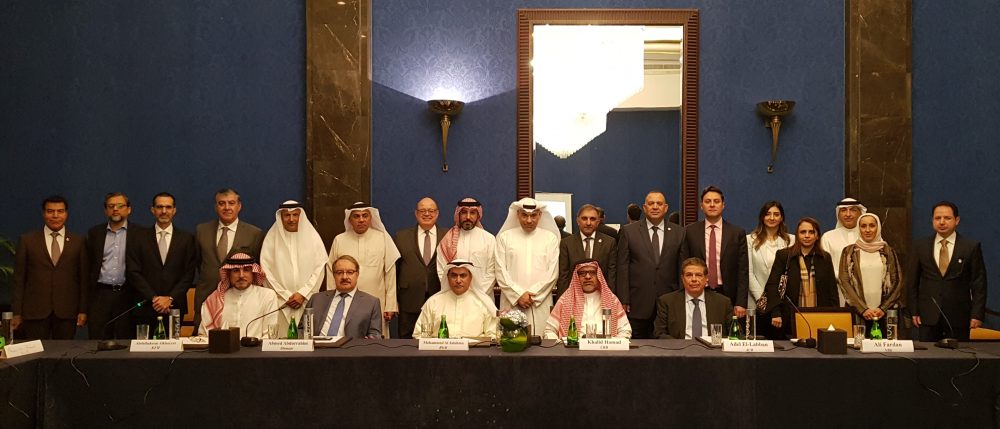Manama, Bahrain – 8 December 2019 – The Waqf Fund organized its 11th Corporate Governance workshop in Bahrain to discuss the various issues related to whistleblowing, responsibilities towards customers and the purpose of the corporation. 24 people including Board members and CEOs of Waqf Fund member institutions attended the workshop.
Dr. Nabil El-Hage, an expert on corporate governance and a former professor of Harvard Business School, led the workshop. He discussed various cases and facilitated a lively discussion among the participants. The key learning points from the cases and the discussion are presented below:
- To avoid a situation where an employee is forced to blow the whistle, listen to what your people are saying; if you don’t take their concerns seriously, they will.
- Make sure your whistle-blowing policy doesn’t just deal with “How to blow the whistle” and “Whistle-blower protections”, but also with what should happen after the whistle has been blown.
- Don’t just rely on having a thorough whistle-blowing policy; create a culture that encourages choosing the right course of action and reward such behavior.
- If an allegation comes in over the whistle-blowing “line” that, if true, could have serious consequences, then think twice before having the inside team investigate it. If the allegation is serious, the inside team may have a difficult time being truly independent.
- It is only human nature to try to cover up in order to save oneself (“if we accept there was an internal control weakness it means repercussions for everyone – so denial is better”). Hence there may be a very good reason to have an external party conduct an investigation.
- A Board member has a fiduciary duty towards the institution and its shareholders/stakeholders, which means a duty of care, candor and loyalty.
- Duty of care demands of a Board member to:
- Always be prepared
- Do your homework
- Read your Board package
- Be alert
- Ask questions
- Attend all meetings, in person and in spirit
- Do not act while uninformed / unconvinced
- Duty of candor requires:
- Always be honest – with your Board, shareholders and regulator
- Make full disclosure
- Remember that bad news travels faster than good news
- Duty of loyalty means:
- Always put the interest of the organization ahead of your own
- No self-dealing
- Any related party transactions must be fully disclosed, done at arm’s length and approved by disinterested (non-conflicted) directors
- Avoid to the greatest extent possible any conflicts of interest
- Remember that shareholders’ trust has to be earned (and retained) by the Board
- There are obligations towards the customer, such as:
- Truth in labeling your product
- Truth in advertising
- Prohibition of selling harmful products
- Fraud prohibitions
- In an age of hyper media presence ethical considerations are no longer an option but a must, in order to sustain long term reputation, relationships and business.
- Pressures to deceive are pervasive, and we need to be prepared to be confronted by difficult moral decisions.
- Given the global populist mood and demonization of big business it is likely that new grounds will be broken regarding business’s responsibilities towards customers.
- Businesses, and especially financial institutions, need to regain the lost trust of the society by going beyond the normal call of duty. Fulfilling merely the legal responsibilities is no longer enough.
- Remember the triple lens; only those activities should be undertaken that pass through all three lenses – economically profitable, legally allowed and ethically defensible.
- The Business Roundtable, an influential group of the largest US companies, has come up with a stakeholder (vs. shareholder) focused purpose of the corporation. It calls for companies to serve all the stakeholders by delivering:
- Value to customers
- Investing in employees
- Dealing fairly with suppliers
- Supporting the communities in which companies operate
- Protecting the environment; and
- Generating long term value for shareholders
- Both the shareholder and the stakeholder centric models converge in the long term:
- Can you consistently create shareholder value without taking good care of your customers?
- Can you abuse your employees and still create long-term shareholder value?
- Can you continue to harm the environment or show apathy towards the community you do business in and avoid adverse consequences?
- Because of short term pressures it becomes critically important to consciously look at the world through the stakeholder lens, rather than the shareholder-only lens.
At the end the Chairman of the Waqf Fund, Mr, Khalid Hamad, thanked the participants and the presenter for their contribution to a successful workshop. He encouraged the participants to continue to attend the workshops in the future (organized twice a year) which should help them carry out their responsibilities as Board members more effectively.

